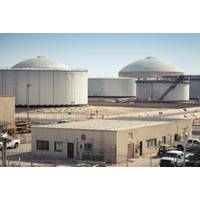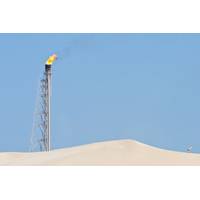Oil Prices Rise Over 2% as US Inventories Decline

Oil prices rose for a second day on Friday as the market reacted to falling U.S. inventories.Signs of strong Asian demand from both China and India also strengthened the market.Brent crude oil futures were up $1.49, or 2%, at $75.60 a barrel by 1:12 p.m. ET (1712 GMT). U.S. West Texas Intermediate futures were up $1.67, or 2.3%, at $74.61."The market is coming to grips with the historic drop in U.S. oil inventories, and dimmed prospects of Iranian oil returning to the market," said Phil Flynn, senior analyst at Price Futures Group in Chicago.Still…
Oil Gains as OPEC Sticks to Supply Cuts

OPEC cuts expected to remain despite Trump pressure. Separately, oil supported by unexpected drop in U.S. inventories.Oil rallied for a second day on Wednesday, buoyed by an unexpected decline in U.S. crude inventories and after Saudi Arabia appeared undaunted by pressure from U.S. President Donald Trump on OPEC to prevent steeper price rises.Saudi Energy Minister Khalid al-Falih said OPEC and its partners were "taking it easy" in response to a tweet from Trump on Monday that called on the group to slacken its restrictions on crude production."We are taking it easy. The 25 countries are taking a very slow and measured approach.
Qatar to Leave OPEC

Qatar said on Monday it was quitting OPEC from January to focus on its gas ambitions, taking a swipe at the group's de facto leader Saudi Arabia and marring efforts to show unity before this week's meeting of exporters to tackle an oil price slide.Doha, one of OPEC's smallest oil producers but the world's biggest liquefied natural gas (LNG) exporter, is embroiled in a protracted diplomatic row with Saudi Arabia and some other Arab states.Qatar said its surprise decision was not driven by politics but in an apparent swipe at Riyadh…
After Trump Calls, Gulf OPEC Members Cover Most of Iran Oil Loss
OPEC oil supply has fallen in November from a two-year high due to U.S. sanctions on Iran, a Reuters survey found, although most of the output gap left by Iran was plugged by Saudi Arabia and the UAE in response to calls from U.S. President Donald Trump.The 15-member Organization of the Petroleum Exporting Countries has pumped 33.11 million barrels per day this month, the survey on Friday found, down 160,000 bpd from October, which was the highest by OPEC as a group since December 2016.The survey adds to indications that OPEC output remains ample despite U.S. sanctions imposed on Iran this month.
OPEC Output Hike Will Squeeze Oil Buffer to Historic Lows

The oil industry will face the biggest squeeze on its spare production capacity in more than three decades if OPEC and its allies agree next week to hike crude output, leaving the world more at risk of a price spike from any supply disruption.Spare capacity is the extra production oil producing states can bring onstream and sustain at short notice, providing global markets with a cushion in the event of natural disaster, conflict or any other cause of an unplanned supply outage.That buffer could shrink from more than 3 percent of global demand now to about 2 percent…
OPEC to Stick to Supply Curbs Despite Oil Rally to $71

OPEC and its allies look set to keep their deal on cutting oil supplies for the rest of 2018, five sources familiar with the issue said, although some producers are starting to worry that high prices may be giving too much stimulus to rival output. OPEC, Russia and several other non-OPEC producers have curbed output since January 2017 to erase a global glut of crude that had built up since 2014. They have extended the pact until the end of 2018, and meet on June 22 to review policy. The deal has boosted oil prices, which topped $71 a barrel this year for the first time since 2014. They were close to $70 on Wednesday.
Gulf OPEC Producers to Keep Q1 Oil Output Below Level
Gulf OPEC producers plan to keep their oil output in the first quarter of 2018 below the year-earlier level despite strong demand growth and a decline in global inventories, a senior OPEC source familiar with Gulf oil thinking said on Friday. "Gulf oil producers want to make sure that the excess in commercial oil inventories which was built over the past three years will be wiped out completely," the source said. "The joint OPEC, non-OPEC monitoring committee headed by Saudi Arabia will continue to monitor the market and make sure all countries are adhering to their cuts," the source added.
OPEC, Non-OPEC Discuss Extending Supply Cut

OPEC and non-member oil producers are considering extending a global supply cut for nine months or more to avoid a price-sapping output increase in the first quarter of next year, when demand is expected to be weak, OPEC and industry sources said. The Organization of the Petroleum Exporting Countries, Russia and other producers agreed last year to curb production by 1.8 million barrels per day for six months from Jan. Oil prices have gained support but global inventories remain high, pulling crude back below $50 a barrel and putting pressure on OPEC to extend the cuts through the rest of 2017.
OPEC Leans Toward Oil Cut Extension, But Non-members Need To Be In
OPEC oil producers increasingly favour extending beyond June a pact on reducing crude supply to balance the market, sources within the group said, although Russia and other non-members need to remain part of the initiative. The Organization of the Petroleum Exporting Countries is curbing its output by about 1.2 million barrels per day (bpd) from Jan. 1 for six months, the first reduction in eight years. Russia and other non-OPEC producers agreed to cut half as much. The deal has lifted oil prices, but inventories in industrial nations are rising and higher returns have encouraged U.S. companies to pump more.
OPEC Compliance Growing as Laggards Come into Line
OPEC compliance 88 percent based on industry average. OPEC has so far surprised the market by showing record compliance with oil-output curbs and could do so further in coming months as the biggest laggards - the United Arab Emirates and Iraq - pledge to catch up quickly with their targets. The Organization of the Petroleum Exporting Countries has pledged to curb its production by about 1.2 million barrels per day (bpd) from Jan. 1, the first cut in eight years, to boost prices and get rid of a supply glut.
Kuwait Cuts January Output to Agreed OPEC Target
Saudi Arabia cuts output in Jan to around 10.058 mln bpd. Gulf OPEC member Kuwait has reduced oil production in January to around 2.707 million barrels per day, meeting its output target under an OPEC supply cut agreement, a Kuwaiti oil official said on Friday. It joins Saudi Arabia, the world's top oil exporter and biggest OPEC producer, which also cut production this month by at least 486,000 bpd to its 10.058 million bpd target, according to a Gulf source familiar with Saudi oil policy, meaning it fully implemented OPEC's agreement to reduce output.
OPEC Closer to Output Deal
OPEC is moving closer towards finalising this month its first deal since 2008 to limit oil output, with most members prepared to offer Iran significant flexibility on production volumes, ministers and sources said on Friday. Iran has been the main stumbling block for such a deal because Tehran wants exemptions as it tries to regain oil market share after the easing of Western sanctions in January. Iran's rival Saudi Arabia, the biggest producer in the Organization of the Petroleum Exporting Countries, has argued Iran's output has peaked and it should not be granted major concessions.
Oil Rises Above $50 on OPEC Cut Comments
Oil edged above $50 a barrel on Thursday, drawing support from sources' comments that OPEC's Gulf members are willing to cut their output by 4 percent and from a further drop in U.S. crude inventories. Saudi Arabia and its Gulf OPEC allies are willing to make that reduction from their peak oil output, energy ministers from the Gulf countries told their Russian counterpart this week, sources familiar with the matter told Reuters. "That seems to be the reason behind the price move," said Carsten Fritsch, analyst at Commerzbank. Brent crude was up 38 cents at $50.36 a barrel as of 1348 GMT, having risen as high as $50.67 intra-day.
As Cracks Emerge in Global Oil Pact, Saudis May Need to Compromise
Tough negotiations await a group of OPEC experts as they meet their counterparts from other oil producers such as Russia on Oct. 28-29 to hammer out details of an output-capping agreement, with disagreements threatening to scupper the deal. OPEC agreed in Algeria last month on a modest oil-production cut in the first such pact since 2008, with the group's top producer Saudi Arabia softening its stance on arch-rival Iran amid mounting pressure from low oil prices. But cracks have surfaced in the Algiers agreement…
Saudis Offer Production Cut if Iran Agrees to Same
Saudi Arabia has offered to reduce oil production if rival Iran agrees to cap its own output this year, in a major compromise ahead of talks in Algeria next week, three sources familiar with the discussions told Reuters. The offer, which has yet to be accepted or rejected by Tehran, was made this month, the sources told Reuters on condition of anonymity. Riyadh is ready to cut output to levels seen early this year in exchange for Iran freezing production at the current level, which is 3.6 million barrels per day, the sources said. "They (the Saudis) are ready for a cut but Iran has to agree to freeze," one source said.
Oil Producers Could Revive Output Freeze
Gulf OPEC members don't oppose resurrecting freeze talks. Russian Energy Minister Alexander Novak has a contrarian message for those who question the wisdom of freezing global levels of oil output. Despite the collapse of talks on restraining production among OPEC and non-OPEC members earlier this year, he thinks the discussions were a success that might soon be repeated. "It (the build-up to the meeting) paved the way for a reversal of negative trends in the oil markets," Novak told reporters last week after meeting OPEC member Venezuela's oil minister Eulogio del Pino.
Oil Falls Ahead of OPEC Meeting
Focus on output ahead of OPEC meeting on Thursday; analysts see potential for demand stalling in Asia. Oil prices fell on Wednesday on expectations of OPEC inaction on output as its focus stays on retaining market share, while concerns about China's economy weighed on the demand outlook. Brent crude was at $49.19 per barrel at 1116 GMT, down 70 cents. It earlier fell more than $1 to the day's low of $48.86. U.S. crude futures were down 74 cents at $48.36 a barrel. Gulf OPEC members including Saudi Arabia are looking to revive the idea of coordinated oil-output action by major producers when the group meets on Thursday…
Saudi Oil Policy Could Become More Transparent
The appointment of Khalid al-Falih as Saudi Arabia's new energy minister to replace veteran oil minister Ali al-Naimi is likely to bring a big shift in style even if the substance of policy remains largely unchanged. Naimi has served as the minister of petroleum and natural resources since 1995 and has long indicated a wish to retire ("Saudi considers Naimi's successor as oilmin", Reuters, 2010). Plans to name a successor as part of a cabinet reshuffle in 2011 were postponed when unrest spread across the Arab world, including neighbouring Bahrain.
Shift in Saudi Oil Thinking Deepens OPEC Split
As OPEC officials gathered this week to formulate a long-term strategy, few in the room expected the discussions would end without a clash. But even the most jaded delegates got more than they had bargained with. "OPEC is dead," declared one frustrated official, according to two sources who were present or briefed about the Vienna meeting. This was far from the first time that OPEC's demise has been proclaimed in its 56-year history, and the oil exporters' group itself may yet enjoy a long life in the era of cheap crude.
Shift in Saudi oil thinking deepens OPEC split
Saudis no longer targetting oil prices. As OPEC officials gathered this week to formulate a long-term strategy, few in the room expected the discussions would end without a clash. But even the most jaded delegates got more than they had bargained with. "OPEC is dead," declared one frustrated official, according to two sources who were present or briefed about the Vienna meeting. This was far from the first time that OPEC's demise has been proclaimed in its 56-year history, and the oil exporters' group itself may yet enjoy a long life in the era of cheap crude.